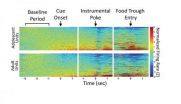(Press-News.org) KNOXVILLE -- Four letter words may offend you more depending on which television channel you watch, according to a recent study out of Florida State University and the University of Tennessee, Knoxville.
This study, published in the January issue of Mass Communication and Society, found that some TV viewers believe swearing on premium channels and cable is less offensive than vulgarity on broadcast channels. Similarly, viewers are more tolerant of swearing on the premium channels than they are on the advertiser supported cable channels. This differs from previous research, which found that how swear words reach people does not effect how offensive they are.
Authors Daniel Shafer and the late Barry Sapolsky, both from Florida State University, and Barbara Kaye from the University of Tennessee, Knoxville, School of Journalism and Electronic Media, also found sexually suggestive words as the most offensive and excretory language as moderately offensive, while more mild language and religious blasphemy were less offensive. This applies in general conversation or TV viewing.
The study consisted of 500 college students in the southeastern U.S. The students completed an online survey that asked them to rate the offensiveness of swear words over three types of programming: broadcast, cable, and premium channels. These students also answered questions on their political and religious views, as well as how often they swore themselves.
How offended they were by profanity was linked to the social, religious or political group they are affiliated with, the authors found. Swearing by college students, for example, was generally more accepted because it often was not taken literally: "College-age participants may be habituated to these words and do not find them as troubling as their status as indecent words banned from broadcast television would imply, indicating a connotative shift from their literal meanings to expressions of anger," according to the authors. The study also found that women tend to be more offended by swearing than men, as are conservatives compared to liberals, and regular churchgoers compared to less religious individuals.
The increased use of colorful language in recent years on TV may make vulgarity more normal as might the lack of distinction between broadcast and cable channels, the authors wrote. Fewer people are watching channels broadcast directly over the air and those who remember doing so are become fewer and fewer as the population ages. Nonetheless, according to the study, viewers currently are much less likely to take offense to cursing by Dexter Morgan on Showtime or Conan O'Brien on TBS than by George Stephanopoulos on ABC.
INFORMATION:
Florida State, UT researchers: Swear words less offensive on cable than broadcast TV
2011-01-27
ELSE PRESS RELEASES FROM THIS DATE:
Megalomaniac CEOs: Good or bad for company performance?
2011-01-27
St. John's, CANADA —January 26, 2011— According to a new study, dominant CEOS, who are powerful figures in the organization as compared to other members of the top management team, drive companies to extremes of performance. Unfortunately for shareholders, the performance of a company with an all powerful CEO can be either much worse than other companies, or much better. But there is one solution to an all powerful CEO: a strong board of directors. Companies with strong boards counteract powerful CEOS, and swing the tide of performance to the plus side. This study on dominating ...
First pediatric surgical quality program shows potential to measure children's outcomes
2011-01-27
CHICAGO (January 26, 2011) – A first of its kind surgical quality improvement program for children has the potential to identify outcomes of children's surgical care that can be targeted for quality improvement efforts to prevent complications and save lives. The results of a study of the American College of Surgeons National Surgical Quality Improvement Program-Pediatric (ACS NSQIP Peds) phase 1 pilot were published in the January issue of the Journal of the American College of Surgeons.
A partnership of the American College of Surgeons (ACS) and the American Pediatric ...
New anti-HIV gene therapy makes T-cells resistant to HIV infection
2011-01-27
New Rochelle, NY, January 26, 2011—An innovative genetic strategy for rendering T-cells resistant to HIV infection without affecting their normal growth and activity is described in a paper published in Human Gene Therapy, a peer-reviewed journal published by Mary Ann Liebert, Inc. (www.liebertpub.com). The paper is available free online at www.liebertpub.com/hum
A team of researchers from Japan, Korea, and the U.S. developed an anti-HIV gene therapy method in which a bacterial gene called mazF is transferred into CD4+ T-cells. The MazF protein is an enzyme (an mRNA interferase) ...
Pitt team finds teen brains over-process rewards, suggesting root of risky behavior, mental ills
2011-01-27
PITTSBURGH—University of Pittsburgh researchers have recorded neuron activity in adolescent rat brains that could reveal the biological root of the teenage propensity to consider rewards over consequences and explain why adolescents are more vulnerable to drug addiction, behavioral disorders, and other psychological ills.
The team reports in the Journal of Neuroscience that electrode recordings of adult and adolescent brain-cell activity during the performance of a reward-driven task show that adolescent brains react to rewards with far greater excitement than adult brains. ...
Sharing child caregiving may increase parental conflict, study finds
2011-01-27
COLUMBUS, Ohio -- Parents who share caregiving for their preschool children may experience more conflict than those in which the mother is the primary caregiver, according to a new study.
Results showed that couples had a stronger, more supportive co-parenting relationship when the father spent more time playing with their child. But when the father participated more in caregiving, like preparing meals for the child or giving baths, the couples were more likely to display less supportive and more undermining co-parenting behavior toward each other.
The results were ...
Centuries of sailors weren't wrong: Looking at the horizon stabilizes posture
2011-01-27
Everybody who has been aboard a ship has heard the advice: if you feel unsteady, look at the horizon. For a study published in Psychological Science, a journal of the Association for Psychological Science, researchers measured how much people sway on land and at sea and found there's truth in that advice; people aboard a ship are steadier if they fix their eyes on the horizon.
Thomas A. Stoffregen of the University of Minnesota has been studying "body sway" for decades—how much people rock back and forth in different situations, and what this has to do with motion sickness. ...
Low socioeconomic status increases depression risk in rheumatoid arthritis patients
2011-01-27
A recent study confirmed that low socioeconomic status (SES) is associated with higher risk of depressive symptoms in patients with rheumatoid arthritis (RA). Statistically significant differences in race, public versus tertiary-care hospital, disability and medications were found between depressed and non-depressed patients. Study findings are reported in the February issue of Arthritis Care & Research, a journal published by Wiley-Blackwell on behalf of the American College of Rheumatology (ACR).
Roughly 1.3 million Americans are affected by RA—a chronic autoimmune ...
Waterhemp rears its ugly head ... again
2011-01-27
Waterhemp has done it again. University of Illinois researchers just published an article in Pest Management Science confirming that waterhemp is the first weed to evolve resistance to HPPD-inhibiting herbicides.
"A fifth example of resistance in one weed species is overwhelming evidence that resistance to virtually any herbicide used extensively on this species is possible," said Aaron Hager, U of I Extension weed specialist.
Waterhemp is not a weed species that can be adequately managed with one or two different herbicides, Hager said. This troublesome weed requires ...
Agave fuels global excitement as a bioenergy crop
2011-01-27
Scientists found that in 14 independent studies, the yields of two Agave species greatly exceeded the yields of other biofuel feedstocks, such as corn, soybean, sorghum, and wheat. Additionally, even more productive Agave species that have not yet been evaluated exist.
According to bioenergy analyst, Sarah Davis, "We need bioenergy crops that have a low risk of unintended land use change. Biomass from Agave can be harvested as a co-product of tequila production without additional land demands. Also, abandoned Agave plantations in Mexico and Africa that previously supported ...
The undead may influence biodiversity, greenhouse gas emissions
2011-01-27
EAST LANSING, Mich. — It's commonly known, at least among microbiologists, that microbes have an additional option to living or dying — dormancy.
Dormant microbes are less like zombies and more like hibernating bears. What isn't known, however, is how large numbers of dormant microorganisms affect the natural environments when they act as microbial seed banks. In the current issue of Nature Reviews: Microbiology, Jay Lennon, Michigan State University assistant professor of microbiology and molecular genetics, examines the cellular mechanisms that allow microbes to hibernate ...


